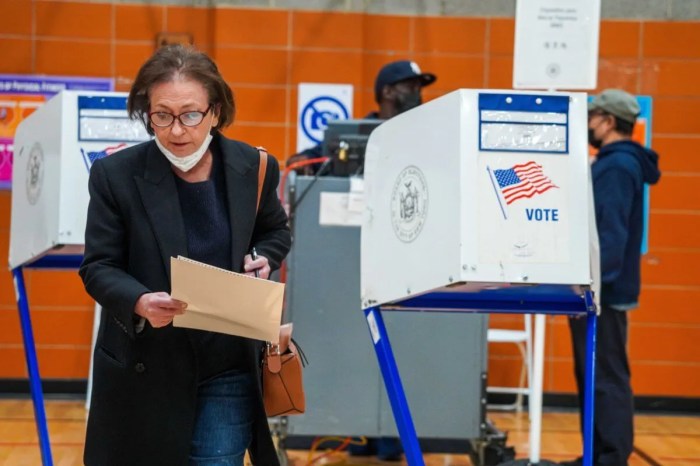A three-judge panel of the US 11th Circuit Court of Appeals, which has jurisdiction over federal appeals from Alabama, Florida, and Georgia, affirmed a district court ruling in favor of a transgender police officer from Houston County, Georgia, who was denied insurance coverage for her gender-confirming surgery under the county’s employee health insurance plan. The 2-1 panel ruling was split along party lines: Two judges who were appointed by Democratic presidents Clinton and Obama voted in favor of the plaintiff, while a judge appointed by Republican president Trump filed a dissenting opinion. Attorneys from the Transgender Legal Defense and Education Fund represent the transgender officer, Anna Lange, a 15-year veteran of the Houston County Sheriff’s Office.
If the county decides to appeal, its chances of prevailing in an “en banc” consideration by the full 11th Circuit bench seem predictably good, since the court has seven Republican appointees and only five Democratic appointees. In his four-year term, President Trump filled six vacancies, half the full bench. So far, President Biden has only had the opportunity to appoint one judge to the 11th Circuit. An entry on Judge Treadwell’s docket reflects his expectation that an 11th Circuit decision could be followed by a petition to the Supreme Court from the losing side seeking final appellate review.
Deputy Sheriff Lange began her gender transition in 2017, after being diagnosed with gender dysphoria. Her transition began with hormone treatment followed by “top surgery,” but these efforts did not dispel her gender dysphoria, and on the recommendation of her endocrinologist, two psychologists, and a surgeon, she determined that a vaginoplasty — also known as “bottom surgery” — was the next step of her treatment. She met with Houston County’s Personnel Director, Kenneth Carter, on April 18, 2018, to find out whether the county health plan, which provided insurance coverage to the Sheriff’s Office, would cover her transition. He told her it would not.
This was, incidentally, her official “coming out” as transgender to her employer and led to a meeting with Carter and Sheriff Cullen Talton that afternoon. Talton reacted with disbelief, thinking it was a joke, and told Lange he did not “believe in sex changes,” but he agreed that she could wear a female uniform at work and present herself as female. He warned her she would need “tough skin” to deal with her co-workers in the Criminal Investigation Division (CID). Talton restated his “disbelief” in a meeting of the CID staff at which Lange came out to her co-workers. Talton told the group that what Lange was doing “takes big balls.” The decision by US District Judge Marc Treadwell does not indicate whether this was intended as irony or humor.
In 1998, the county had its insurance plan amended to specifically exclude coverage for “sex change surgery.” When the county’s contract with its plan administrator, Anthem Blue Cross Blue Shield, came up for renewal in 2016, Anthem advised Carter that due to guidance from the Obama Administration under the Affordable Care Act, Anthem was removing the exclusion for “sex change surgery” from its standard policies, but individual employers could opt to keep the exclusion. The county decided to keep the exclusion. Lange decided to appeal Carter’s determination that her surgery would not be covered, ultimately taking the issue to a public meeting of the county commissioners, but they stood firm on keeping the exclusion, even though Anthem advised them that the cost of eliminating the exclusion was expected to be “low.” The county claims that its decision was motivated by concern that ending this exclusion would open up demands by employees to cover many other procedures and medications that were excluded under the health plan, which excludes 68 specific medical procedures and 29 pharmacy benefits. This could make the affordable health plan much more expensive for the county.
Deputy Sheriff Lange filed charges with the Equal Employment Opportunity Commission (EEOC) claiming violations of Title VII of the Civil Rights Act and the Americans with Disabilities Act (ADA), statutes enforced by that agency, in July 2019, more than a year before the Supreme Court ruled that discrimination by employers because of “transgender status” violated the ban on discrimination because of sex in Title VII. Her claim under the ADA ran into the problem that the statute expressly excludes coverage as a disability of “gender identity disorders not resulting from physical impairments.” Federal courts are divided about whether this exclusion applies to gender dysphoria. The county Commissioners’ vote to keep the exclusion came after the EEOC had issued a “right-to-sue” letter to Lange, but before she filed her lawsuit, which was prompted by this final rejection of her appeal.
Lange’s lawsuit against the county and Sheriff Talton claimed violations of Title VII, the ADA, the federal Vocational Rehabilitation Act, and the Equal Protection provisions of the federal and state constitutions. Ruling on motions by all parties for summary judgement in June 2022, Judge Treadwell found that the ADA exclusion applied, granting summary judgment to the county on that claim, but that disputes about material facts precluded granting summary judgment on the federal Equal Protection, which is still pending before the District Court. However, Judge Treaadwell ruled that there was a clear violation of Title VII by the county. The court awarded Lange $60,000 in damage, and issued an injunction under Title VII against enforcement of the “sex change surgery” exclusion.
The only issue before the 11th Circuit panel was the county’s appeal of the Title VII ruling. Writing for the majority of the panel, Judge Charles R. Wilson (a Clinton appointee) agreed with Judge Treadwell that the county could be sued under Title VII, even though it was not directly Lange’s employer, because in providing health insurance the county was acting as an agent of the Sheriff’s Department. More significantly, the court agreed with Treadwell that the exclusion was a clear violation of Title VII under the Disparate Theory of employment discrimination. Under this theory, discriminatory intent is inferred from a provision that discriminates on its face. By excluding coverage for “sex change surgery,” the county had adopted a policy that was clearly directed at transgender employees, for the simple reason that only transgender employees would need such surgery. While the county claimed their action was not intended to discriminate, the court deemed that irrelevant to a disparate treatment claim. Circuit Judge Jill A. Pryor (an Obama appointed) joined Wilson’s opinion.
In his opinion, Judge Wilson noted that on April 29, 2024, the EEOC issued updated enforcement guidelines on sexual harassment in the workplace under Title VII, expressly incorporating the reasoning of the Bostock decision to apply to sexual harassment claims, but this guidance does not directly address the issue of health insurance coverage for gender transition. Earlier guidance under the Affordable Care Act (ACA) has not been decisive on this issue, and the ACA would not apply to the insurance plan adopted by Houston County in any event.
Dissenting Judge Andrew Brasher (a Trump appointee) dissented, arguing that the exclusion was not facially discriminatory because it applied to all employees. He found an analogy in an old Supreme Court case that held exclusion of pregnancy benefits from an employee health policy did not violate federal sex discrimination prohibitions because all employees were deprived of the benefits and some who did not become pregnant did not need them. Congress later partially overruled this holding in the Pregnancy Discrimination Act.
Instead, Brasher argued, the trial court should have considered this as a “disparate impact” case, where a policy that was neutral on its face was claimed to disproportionally disadvantage a particular group of employees. In such cases, however, an employer can defend against the discrimination claim by showing that it had a legitimate business reason for the challenged policy. By granting summary judgment to Deputy Sheriff Lange, Judge Treadwell had denied Houston County the chance to prove a legitimate business reason. Brasher would have reversed the summary judgment and sent the case back to the trial court for further consideration, presumably as part of the trial on Lange’s Equal Protection Claim, under which she would have the burden to show discriminatory motivation by the county in sticking with the exclusion even though Anthem had advised them that it was eliminating the exclusion from its general policies in response to federal guidance under the Affordable Care Act.
The next steps in this case are open to question. Judge Treadwell scheduled a trial to take place in February 2023 on the constitutional claim, but the parties agreed to delay that while waiting for the 11th Circuit to issue its opinion. In the meantime, the 11th Circuit decided a transgender high school student’s discrimination case about restroom usage, ruling in favor of the school district, and Judge Treadwell had asked the parties to supplement their briefs to deal with anything from that decision, Adams v. School Board of St. Johns County, that they deemed necessary to address.


































